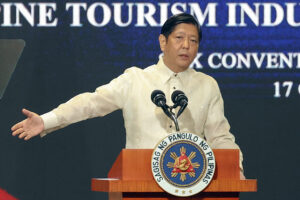A glimpse of what lies ahead

A Philippine president’s six-year term is composed of 2,190 days. Still, we assign great importance to the first 100 days, even though it is a fraction of the total number, because of several reasons: The initial period gives us an initial impression of what the entire presidency might be like, and a preview of the things it deems important. It gives us a taste of a particular president’s brand of leadership, and an idea of what to expect for the remainder of his term. We get a sense of whether we should brace ourselves for a difficult ride, or rest assured that our country — even if beset by many problems — is under sound stewardship.
This was what we discussed last Friday during the virtual town hall discussion organized by the Stratbase ADR Institute. Entitled “Continuity and Change? An Assessment of the President’s First 100 Days in Office,” the event gathered a select panel of policy and governance experts. We talked about what we might glean from the first actions and decisions made by President Ferdinand Marcos, Jr., — a majority president elected by 31 million Filipinos last May.
Marcos Jr. now faces the daunting task of addressing the lingering issues brought upon by the COVID-19 pandemic, as well as by other external risks that threaten the country’s growth. These issues range from social inequality, poverty, unemployment inflation, corruption, the digital gap, to traditional security risks.
In my opening remarks, I conveyed my impression that at the very least, based on the President’s words and decisions in the past few weeks, we have reason to be hopeful that he has set a good direction for the country in terms of goals and priorities. Mr. Marcos has very clearly outlined his legislative agenda. He has appointed some competent people in crucial posts. Judging from appearances, this administration would be run, not on a whim like the previous administration was, but with much more rationality and deliberation in the next six years.
That gives us a measure of relief — at least, for now.
Pulse Asia President Dr. Ronald Holmes said that to a certain extent, “the administration has indeed done much in the last 100 days and there are certain indicators of what Marcos Jr. refers to as a functional government.” He cited the many meetings in key areas already convened by the President during his first three months. They were also able to submit the 2023 budget in good time for Congressional deliberation.
There is a crucial challenge, though — this administration should strengthen, rather than erode, our democratic institutions and virtues. The issues of disinformation and protection of basic freedoms must be addressed.
Calixto “Toti” Chikiamco, President of the Foundation for Economic Freedom, was more nuanced in his observations. On the plus side, he said Marcos Jr. had been able to correct the mistakes of his immediate predecessor in terms of public-private partnerships and achieve a more balanced foreign stance with China and the US, unlike the policies of Duterte (pro-China) and the late Benigno Aquino III (pro-US).
Mr. Chikiamco said he wanted to see a clear economic legislative agenda addressing the food shortage and fostering long-term, sustainable growth. “Fiscal consolidation and increasing taxes are not enough,” he said. His advice was to operationalize the Public Service Act, establish a roadmap to boost mining, and have a clear plan to address the health crisis — emphasizing that COVID-19 is not yet over — more decisively.
Zy-Za Nadine Suzara, Executive Director of the Institute for Leadership, Empowerment, and Democracy (iLEAD), commented on the apparent priorities of the Marcos administration as can be seen from its budget — priorities that do not seem to include economic recovery and the continued fight against COVID-19. Military spending and infrastructure seem to be important to this administration, she said, and there is less emphasis on people-centered programs.
“Let’s see if there might be some changes in the next years and if there will be improvements in how these budgets are spent for programs that will benefit ordinary Filipinos,” she said.
Finally, Coco Alcuaz, executive director of the Makati Business Club, said the business sector welcomes Marcos’ words on partnerships, participation, and making the Philippines an investment destination.
“This is a very good signal that there will be a change in how the government deals with the private sector as compared with the previous administration,” he said, saying that the private sector really, truly wants to work with the government.
No doubt, all of us will be closely watching how the Marcos Jr. administration would perform in the next six years. And while we take the President’s early pronouncements as encouraging, we also want to convey that we will be cautious and demanding. We want accountability at the core of governance and in the implementation of public policies.
It will not be too much for the people to demand accountability for what has been articulated and promised, for what has yet to be done, and for succeeding policy choices and decisions. We have given this administration a strong mandate, and we pay our government officials with our hard-earned money, so the Filipino people have every right to exact accountability from those who claim to have the public’s best interests in mind.
Victor Andres “Dindo” C. Manhit is the president of the Stratbase ADR Institute.



